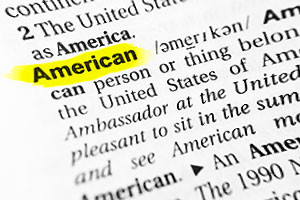
It didn’t take long for Stanford University to make national news from a list of words that it issued in late December. Using the overblown rhetoric that universities love, the list was produced by the “Elimination of Harmful Language Initiative.”
The coverage seems to dismay the masters of Stanford, who thought they were doing something good. The list caused an uproar that led to removing public access to it on its website. However, the scandal remains.
The Ugly (Word) American
Most of the reports centered on one list item: Stanford discourages using the word “American.” The Daily Caller provided a succinct reason. “The list recommends banning the term “American” and replacing it with “U.S. Citizen,” as it reportedly implies that the U.S. is the “most important country in the Americas.”
By assuming the exclusive title of American for its citizens, the United States belittles the forty-two other nations in the Americas that have the right to use it. It also highlights the wealth, military power and cultural influence of the United States as the “most important country,” not just in the Americas but in the world. Thus, those at Stanford and other academies who belong to the “hate America crowd” see it as a legitimate target for elimination.
However, the list’s importance is much greater than one word. For those fighting against “wokeness,” Stanford has provided a kind of road map to the leftist mind. Stanford defines itself by two sets of words, those on the list and those excluded from it.
Obsession With Race
First, the left’s obsession with race is on full display. Curiously though, Stanford’s obsession extends to only two races—black and white. “Blackmark,” “black sheep,” “blackballed,” and “blacklist” are all forbidden, even though they have nothing to do with black people. However, the list justifies excising those terms because each “assigns negative connotations to the color black, racializing the term.”
Help Remove Jesus Bath Mat on Amazon
Likewise, the list forbids “white paper,” “white list,” and “whitespace.” These terms also assign “value connotations based on color (white=good), an act which is subconsciously racialized.”
Thus, Stanford shuns the terms “master” and “slave,” even in contexts far outside of Nicole Hannah Jones’s 1619 Project assertion of “America’s Original Sin.” Slave can never be used—even when referring to non-human contexts. Subsequently, driving near the Stanford campus would be perilous since the “wokesters” would demand the removal of the slave cylinders from the braking systems of their automobiles. Mastering a subject or creating master lists and master schedules are all bad because “masters enslaved people.” Apparently, Stanford still allows students to earn a Master’s Degree.
Obsession with Sex
Surprisingly, those with a “do-your-own-thing” mentality frown upon defining aspects of human sexuality. Their discomfort begins with any word with the syllable “man,” as was found in many professions like policemen or firemen. Thus, the terms man hours, mankind, manmade and manpower are all on the list.
He and she have lost their singularity to become they. Likewise, both ladies and gentlemen are to be known simply as “everyone.”
Satanic Christ Porn-blasphemy at Walmart — Sign Petition
Stanford’s prohibitions extend to illicit sexual practices as well. A child prostitute is a “child who has been trafficked.” At the same time, the word prostitute means those “who engage in sex work.” Referring to someone as a prostitute also “defines people by just one of their characteristics.” The same stricture also applies to convicts, prisoners, homeless people and immigrants.
Perhaps the most telling item on the list is “abort,” meaning to cancel something already in progress. No matter the context, “this term can unintentionally raise religious/moral concerns over abortion.”
Curious Omissions
The forbidden list continues. A more interesting list would be the terms that Stanford didn’t include.
For instance, mockery of religious people is, apparently, acceptable. The Stanford listmakers have no problem allowing the word “cult” to describe Church members who take their spiritual lives seriously. Likewise, calling a Catholic a “Papist” is also fine. Referring to a Baptist as a “Bible thumper” is entirely permissible.
How Panera’s Socialist Bread Ruined Company
Nor are insulting terms against conservatives forbidden. Old terms like “stick in the mud” and “reactionary” are well within allowable limits. The panoply of so-called phobias (homophobia, xenophobia, etc.) is open to liberal attack. Referring to a conservative as a fascist is fine, even though that term accurately describes those who perpetrated the horrors of World War II. Liberals can hurl their most potent insults—racist,” “sexist” and “bigot”—with impunity.
Once, America’s intelligentsia pretended to prize academic freedom and abhor censorship. That commitment was always conditional, and the conditions weighed against the conservative, the religious and the traditional. That façade crumbled years ago. Stanford’s only mistake was making the injustice obvious by publishing a forbidden list.
Photo Credit: © lobro – stock.adobe.com


